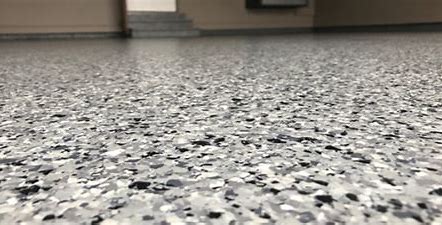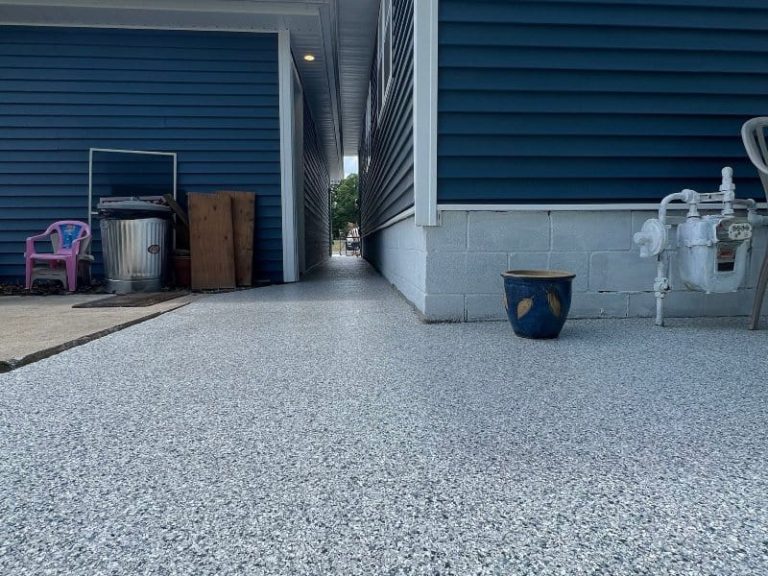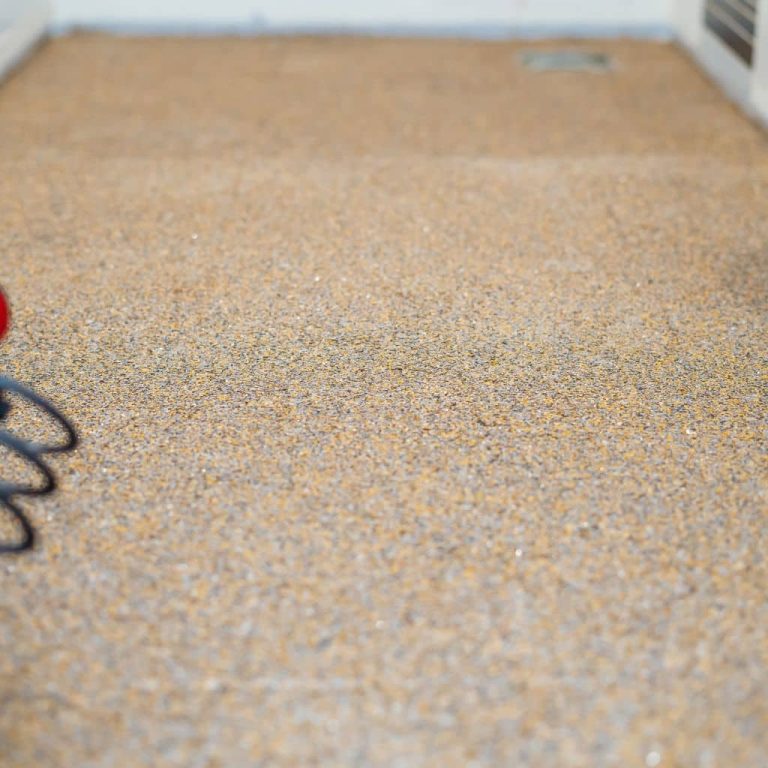Concrete surfaces demand robust protection against diverse environmental stresses and everyday wear. Epoxy and polyurea coatings emerge as leading contenders, each offering distinctive advantages suited to specific needs. This comprehensive guide delves into the attributes of epoxy and polyurea coatings, exploring their applicability indoors and outdoors, in residential and commercial settings. Additionally, we scrutinize their resistance to UV exposure, tire marks, oil stains, temperature variances, surface prep, maintenance requirements, and their typical longevity.
Durability vs. Flexibility: Discerning the Differences
Indoor Versatility
In indoor environments like garages, warehouses, and industrial facilities, durability reigns supreme. Epoxy coatings excel due to their exceptional hardness and resistance to abrasion, chemicals, and stains. Their rigid surface provides enduring protection against heavy machinery, foot traffic, and spills, rendering them ideal for high-traffic areas.
Outdoor Resilience
Outdoor surfaces face a different set of challenges, including temperature fluctuations, UV exposure, and moisture infiltration. Polyurea coatings offer superior flexibility and impact resistance, making them well-suited for outdoor applications such as driveways, patios, and pool decks. They withstand extreme weather conditions without cracking or delaminating, ensuring prolonged performance and minimal maintenance.
Application and Curing Time: Prioritizing Efficiency
Residential Ease
For residential projects where time is of the essence, such as garage floor coatings or basement refinishing, polyurea coatings shine. Their rapid curing time allows for swift installation with minimal disruption to daily life. Homeowners can enjoy a freshly coated surface within hours, transforming their space with minimal downtime.
Commercial Efficiency
In commercial settings like retail stores, restaurants, and healthcare facilities, epoxy coatings offer a durable and aesthetically pleasing solution. Though they may entail longer curing times and extensive surface preparation, their superior chemical resistance and long-term durability make them a preferred choice.
Resistance to UV Exposure, Tire Marks, and Oil Stains: Ensuring Longevity
UV Exposure
Epoxy coatings are prone to yellowing and degradation upon prolonged UV exposure, making them less suitable for outdoor applications without adequate protection. In contrast, polyurea coatings exhibit superior UV resistance, maintaining their color and integrity over time, even in harsh sunlight.
Tire Marks and Oil Stains
Polyurea coatings boast excellent resistance to tire marks and oil stains, making them ideal for surfaces subject to vehicular traffic. Their flexible nature prevents permanent indentation from heavy loads and ensures easy cleanup of oil spills, preserving the surface’s appearance and integrity.
Temperature Variances: Adapting to Environmental Conditions
Temperature Sensitivity
Epoxy coatings may be sensitive to temperature fluctuations during application, requiring controlled conditions to ensure proper curing and adhesion. Polyurea coatings, however, offer greater tolerance to temperature variations, allowing for application in a wider range of environmental conditions without compromising performance.
Surface Prep: Setting the Foundation for Success
Preparation Requirements
Both epoxy and polyurea coatings require thorough surface preparation to ensure proper adhesion and longevity. Surface preparation may involve cleaning, etching, or mechanical abrasion to remove contaminants and create a suitable substrate for coating application. Proper surface prep is essential for achieving optimal results and maximizing the coating’s performance.
Maintenance Requirements: Sustaining Long-Term Performance
Routine Maintenance
Both epoxy and polyurea coatings are relatively low maintenance, requiring only routine cleaning to preserve their appearance and performance. Routine maintenance may include sweeping, mopping, or pressure washing to remove dirt, debris, and stains. Periodic inspections and touch-ups can help address any signs of wear and extend the coating’s lifespan.
Longevity: Assessing Lifespan
Epoxy Coatings
Typically, epoxy coatings last around 5 to 10 years, depending on factors such as surface preparation, application quality, and environmental conditions. While they offer robust protection, they may require recoating or maintenance to address wear and tear over time, especially in high-traffic areas.
Polyurea Coatings
Polyurea coatings boast a longer lifespan of 10 to 15 years or more, thanks to their superior flexibility, UV resistance, and impact resilience. With minimal maintenance requirements and excellent durability, polyurea coatings provide lasting protection for outdoor surfaces subjected to harsh weather and heavy use.
Conclusion: Selecting the Ideal Solution
Choosing between epoxy and polyurea coatings hinges on a thorough understanding of your specific needs and priorities. Whether you prioritize durability, flexibility, quick installation, or long-term performance, there’s a coating solution to match your requirements. Consulting with a qualified contractor or coatings specialist allows for an informed decision tailored to your project’s demands. With the right coating system in place, you can ensure that your concrete surfaces remain protected, resilient, and visually appealing for years to come, even in the face of UV exposure, tire marks, and oil stains.
If you’re in the Chicagoland area and considering epoxy or polyurea coatings, we invite you to schedule a free consultation with our experts at Level 10 Coatings. We’ll help you explore the best options for your space, ensuring a solution that not only meets but exceeds your expectations. Don’t wait to protect and enhance your property—schedule your free consultation today with Level 10 Coatings!


